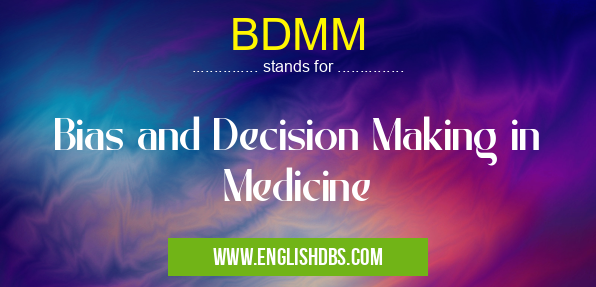What does BDMM mean in MEDICAL
BDMM stands for Bias and Decision Making in Medicine. It is a field of study that examines the various ways in which bias can influence medical decision-making and how to mitigate its effects. Bias can arise from a variety of sources, including personal beliefs, social norms, and institutional policies.

BDMM meaning in Medical in Medical
BDMM mostly used in an acronym Medical in Category Medical that means Bias and Decision Making in Medicine
Shorthand: BDMM,
Full Form: Bias and Decision Making in Medicine
For more information of "Bias and Decision Making in Medicine", see the section below.
Sources of Bias in Medical Decision-Making
- Confirmation bias: The tendency to seek out information that confirms existing beliefs, while ignoring or downplaying evidence that contradicts them.
- Framing effects: The way in which information is presented can influence the choices people make.
- Anchoring bias: The tendency to rely too heavily on the first piece of information received, even when it is not relevant or accurate.
- Availability bias: The tendency to overestimate the likelihood of events that are easily recalled or imagined.
- Groupthink: The tendency to conform to the opinions of the group, even when those opinions are not well-supported.
Consequences of Bias in Medical Decision-Making
Bias can have a significant impact on medical decision-making, leading to:
- Misdiagnosis: Incorrect diagnoses due to biases in data interpretation or patient selection.
- Ineffective treatment: Choosing treatments that are not the best option for the patient based on personal preferences or institutional biases.
- Unequal care: Disparities in care provided to different patient groups due to biases in decision-making.
Mitigating Bias in Medical Decision-Making
Recognizing and mitigating bias in medical decision-making is crucial. Strategies to mitigate bias include:
- Awareness: Understanding the different types of bias and their potential impact.
- Training: Providing education and training on bias prevention and mitigation techniques.
- Tools: Using decision-support tools that help clinicians make more objective decisions.
- Collaboration: Involving multiple healthcare professionals in decision-making to reduce the influence of individual biases.
Essential Questions and Answers on Bias and Decision Making in Medicine in "MEDICAL»MEDICAL"
What is BDMM?
BDMM stands for Bias and Decision Making in Medicine. It refers to the systematic errors in judgment that can influence medical decision-making, leading to suboptimal patient care. These biases can stem from various cognitive and social factors, affecting both individual healthcare providers and healthcare systems as a whole.
How can BDMM impact medical decision-making?
BDMM can manifest in various ways, including:
- Cognitive biases: These are errors in thinking that lead to irrational conclusions, such as confirmation bias (seeking information that confirms existing beliefs) or availability bias (giving more weight to readily available information).
- Social biases: These are prejudices or stereotypes that influence how healthcare providers interact with patients, such as racial bias or gender bias.
- Systemic biases: These are biases embedded in healthcare systems and policies, such as unequal access to care or disparities in treatment outcomes. BDMM can result in misdiagnosis, inappropriate treatments, and reduced patient satisfaction.
What are some common examples of BDMM in medical practice?
Some common examples include:
- Confirmation bias: A physician focusing only on evidence that supports their initial diagnosis, overlooking alternative possibilities.
- Availability bias: A surgeon preferring a surgical procedure they are familiar with, even if a less invasive option would be more suitable.
- Racial bias: A healthcare provider treating a Black patient differently than a White patient, leading to unequal care.
- Gender bias: A physician dismissing a woman's symptoms as "hormonal" without thorough investigation.
- Systemic bias: A policy that restricts access to healthcare for uninsured patients, leading to worse health outcomes.
How can healthcare providers address BDMM?
Addressing BDMM requires a multifaceted approach, including:
- Education: Training healthcare providers on biases and their potential impact.
- Self-reflection: Encouraging providers to recognize and challenge their own biases.
- Bias mitigation strategies: Implementing tools or protocols to reduce the influence of biases in decision-making.
- Systemic changes: Modifying healthcare systems and policies to promote equity and reduce disparities.
Final Words: BDMM plays a critical role in improving the quality and equity of medical care. By understanding the sources, consequences, and mitigation strategies of bias, healthcare professionals can make more informed and unbiased decisions, leading to better outcomes for patients.
BDMM also stands for: |
|
| All stands for BDMM |
